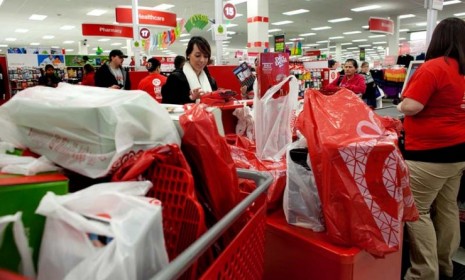What Black Friday says about the economic recovery
Over the holiday weekend, millions of Americans flocked to stores and snapped up bargains online. Does that prove the recovery is finally gathering steam?

A free daily email with the biggest news stories of the day – and the best features from TheWeek.com
You are now subscribed
Your newsletter sign-up was successful
Retail analysts are forecasting the biggest Cyber Monday in history — $1.5 billion in online sales today. And on Black Friday, internet sales topped $1 billion, with millions of shoppers also rushing to snag deals at brick-and-mortar stores over the Thanksgiving weekend, which kicks off the holiday shopping season. Black Friday sales at stores were down 1.8 percent compared to last year, although that might have been because some of the day's spending was siphoned off by earlier-than-ever sales at Walmart and other major retailers that started late Thursday. What does this year's holiday spending frenzy say about the state of the economic recovery? Here, three theories:
America's massive shopping binge suggests the economy is strengthening
"If our collective spending this weekend is any sign, then our economy must be doing very well," says Dominic Dezzutti at CBS News. Looking at the total for sales in stores and online, consumer spending rose by 9.2 percent over last year. And "experts are also giddy over the potential of Cyber Monday," when 129 million Americans are expected to buy something online. It's heartening that most of us feel secure enough to go out and spend for the holidays — even if we're paying for much of the loot with credit cards.
The Week
Escape your echo chamber. Get the facts behind the news, plus analysis from multiple perspectives.

Sign up for The Week's Free Newsletters
From our morning news briefing to a weekly Good News Newsletter, get the best of The Week delivered directly to your inbox.
From our morning news briefing to a weekly Good News Newsletter, get the best of The Week delivered directly to your inbox.
Actually, the Black Friday frenzy proves we're in trouble
The "extreme selfishness and desperation" on display every Black Friday is hardly a good omen, says The Economic Collapse. When "Americans will trample one another just to save a few dollars on a television," you know the hard times are far from over. "Once again we saw large crowds of frenzied shoppers push, shove, scratch, claw, bite and trample one another just to save a few bucks." And let's put another aspect of Black Friday in context: It kills American jobs if consumers spend their hard-earned money on "cheap foreign-made goods" just to satisfy an insatiable hunger for more stuff.
But historically, Black Friday is divorced from the broader economy
History suggests that "Black Friday sales figures offer little, if any, insight about where the economy is headed," says Josh O'Kane at Canada's Globe and Mail. In 2008, for example, Thanksgiving weekend sales jumped by 18 percent over the previous year, suggesting "a vigorous recovery was imminent. As the world now knows, that didn't happen." The brutal recession that followed resulted in tepid Black Friday sales the following year, yet the economy posted a solid 3.9 percent gain in the first quarter of 2010. So if you're sifting through the Black Friday numbers looking for clues on what 2013 holds, "don't waste your time."
A free daily email with the biggest news stories of the day – and the best features from TheWeek.com
-
 The ‘ravenous’ demand for Cornish minerals
The ‘ravenous’ demand for Cornish mineralsUnder the Radar Growing need for critical minerals to power tech has intensified ‘appetite’ for lithium, which could be a ‘huge boon’ for local economy
-
 Why are election experts taking Trump’s midterm threats seriously?
Why are election experts taking Trump’s midterm threats seriously?IN THE SPOTLIGHT As the president muses about polling place deployments and a centralized electoral system aimed at one-party control, lawmakers are taking this administration at its word
-
 ‘Restaurateurs have become millionaires’
‘Restaurateurs have become millionaires’Instant Opinion Opinion, comment and editorials of the day